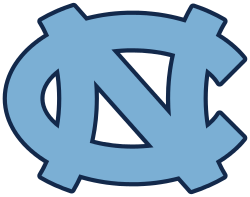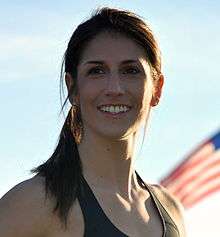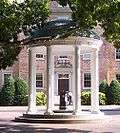North Carolina Tar Heels women's soccer
| North Carolina Tar Heels women's soccer | |||
|---|---|---|---|
 | |||
| University | University of North Carolina at Chapel Hill | ||
| Conference | ACC | ||
| Location | Chapel Hill, NC | ||
| Head coach | Anson Dorrance (37th year) | ||
| Stadium |
Fetzer Field (Capacity: 6,000) | ||
| Nickname | Tar Heels | ||
| Colors |
Carolina Blue and White[1] | ||
| |||
| NCAA Tournament Champions | |||
| 1982, 1983, 1984, 1986, 1987, 1988, 1989, 1990, 1991, 1992, 1993, 1994, 1996, 1997, 1999, 2000, 2003, 2006, 2008, 2009, 2012 | |||
| NCAA Tournament Runner Up | |||
| 1985, 1998, 2001 | |||
| NCAA Tournament Semifinal | |||
| 1995, 2002, 2016 | |||
| NCAA Tournament Appearances | |||
| 1982, 1983, 1984, 1985, 1986, 1987, 1988, 1989, 1990, 1991, 1992, 1993, 1994, 1995, 1996, 1997, 1998, 1999, 2000, 2001, 2002, 2003, 2004, 2005, 2006, 2007, 2008, 2009, 2010, 2011, 2012, 2013, 2014, 2015, 2016 [2] | |||
| Conference Tournament Champions | |||
| 1989, 1990, 1991, 1992, 1993, 1994, 1995, 1996, 1997, 1998, 1999, 2000, 2001, 2002, 2003, 2005, 2006, 2007, 2008, 2009 | |||
| Conference Regular Season Champions | |||
| 1987, 1989, 1990, 1991, 1992, 1993, 1995, 1996, 1997, 1998, 1999, 2001, 2002, 2003, 2004, 2005, 2006, 2007, 2008 | |||

The North Carolina Tar Heels women's soccer team represent the University of North Carolina at Chapel Hill in the Atlantic Coast Conference of NCAA Division I soccer.[3] The team has won 20 of the 27 Atlantic Coast Conference championships, and 22 of the 36 NCAA national championships.
History
The UNC women's soccer team began as a club team established by students looking for high level competition. In 1977, they petitioned the UNC Athletic Director, Bill Cobey, to take the club to the varsity level. Cobey asked Anson Dorrance, then the UNC men's soccer coach to assess the club's ability to transition to varsity status. Dorrance was impressed by the team, then coached by Mike Byers to recommend the school form a women's soccer team. Cobey agreed and hired Dorrance as head coach, with Byers as an assistant, for the 1978 season. That year, the Tar Heels played an essentially club schedule, including games against high school teams. However, in 1979, the Association for Intercollegiate Athletics for Women, at the prompting of Dorrance and University of Colorado coach, Chris Lidstone, established a national women's soccer program.[4] At the time, UNC had the only varsity women's soccer team in the Southeast and this allowed Dorrance to recruit the top talent in the region. In 1981, he recruited one of the most talented freshman squads in the history of women's soccer. Eight of those recruits won starting positions and took the team to the first, and only, AIAW national championship. This group would set the tone for Tar Heels soccer for down through its history. As Dorrance recalls it, "These were the true pioneers. They were given nothing. They were accustomed to taking things and so they weren't as genteel as the sort of young ladies we can recruit now. . . They were the sort of girls who would go downtown, burn it to the ground, . . . But then, they were on time for every single practice and in practice they worked themselves until they were bleeding and throwing up. They had a tremendous commitment to victory and to personal athletic excellence. And for that I admired them because they were a tremendous group. And even though, off the field, I think they all hated each other. But once the game began, there was a collective fury that just intimidated everyone they played against."[5] Building on that competitive drive, the Tar Heels went on to win the first three NCAA championships, and dominate the sport for years to come.
All-time record
| Year | Head Coach | Overall | ACC | ACC Tournament | NCAA Tournament |
|---|---|---|---|---|---|
| 1979 | Anson Dorrance | 10–2–0 | – | – | – |
| 1980 | 21–5–0 | – | – | AIAW Semifinals | |
| 1981 | 23–0–0 | – | – | AIAW Champions | |
| 1982 | 19–2–0 | – | – | Champions | |
| 1983 | 19–1–0 | – | – | Champions | |
| 1984 | 24–0–1 | – | – | Champions | |
| 1985 | 18–2–1 | – | – | Runner Up | |
| 1986 | 24–0–1 | – | – | Champions | |
| 1987 | 23–0–1 | 3–0–0 | – | Champions | |
| 1988 | 18–0–3 | 1–0–1 | Runner Up | Champions | |
| 1989 | 24–0–1 | 4–0–0 | Champions | Champions | |
| 1990 | 20–1–1 | 4–0–0 | Champions | Champions | |
| 1991 | 24–0–0 | 4–0–0 | Champions | Champions | |
| 1992 | 25–0–0 | 4–0–0 | Champions | Champions | |
| 1993 | 23–0–0 | 4–0–0 | Champions | Champions | |
| 1994 | 25–1–1 | 5–1–0 | Champions | Champions | |
| 1995 | 25–1–0 | 7–0–0 | Champions | Semifinals | |
| 1996 | 25–1–0 | 7–0–0 | Champions | Champions | |
| 1997 | 27–0–1 | 7–0–0 | Champions | Champions | |
| 1998 | 25–1–0 | 7–0–0 | Champions | Runner Up | |
| 1999 | 24–2–0 | 7–0–0 | Champions | Champions | |
| 2000 | 21–3–0 | 4–3–0 | Champions | Champions | |
| 2001 | 24–1–0 | 7–0–0 | Champions | Runner Up | |
| 2002 | 21–2–4 | 4–1–2 | Champions | Semifinals | |
| 2003 | 27–0–0 | 7–0–0 | Champions | Champions | |
| 2004 | 20–1–2 | 9–0–0 | Runner Up | Third Round | |
| 2005 | 23–1–1 | 9–1–0 | Champions | Quarterfinals | |
| 2006 | 27–1–0 | 10–0–0 | Champions | Champions | |
| 2007 | 19–4–1 | 9–1–0 | Champions | Third Round | |
| 2008 | 25–1–2 | 9–0–1 | Champions | Champions | |
| 2009 | 23–3–1 | 9–3–0 | Champions | Champions | |
| 2010 | 19–3–2 | 9–3–0 | Semifinals | Third Round | |
| 2011 | 13–5–2 | 6–3–1 | Quarterfinals | Third Round | |
| 2012 | 15–5–3 | 6–3–1 | Quarterfinals | Champions | |
| 2013 | 20–5–0 | 10–3–0 | Semifinals | Quarterfinals | |
| 2014 | 14–4–2 | 9–0–1 | Semifinals | Third Round |
Individual honors
National Coach of the Year:
- Anson Dorrance – 1982, 1986, 1997, 2000, 2001, 2003, 2006
ACC Coach of the Year:
- Anson Dorrance – 1982, 1986, 1997, 2000, 2001, 2003, 2004, 2006
- Shannon Higgins – 1989
- Kristine Lilly – 1991
- Mia Hamm – 1992, 1993
- Tisha Venturini – 1994
- Cindy Parlow – 1997, 1998
- Cat Reddick – 2003
- Crystal Dunn – 2012
ACC Player of the Year:
- Mia Hamm – 1990, 1992, 1993
- Cindy Parlow – 1998
ACC Defensive Player of the Year:
- Crystal Dunn – 2013
ACC Offensive Player of the Year:
- Heather O'Reilly – 2005
- Yael Averbuch – 2006
- Crystal Dunn – 2013
ACC Rookie of the Year:
- Tisha Venturini – 1991
- Cindy Parlow – 1995
- Laurie Schway – 1996
- Lindsay Tarpley – 2002
NCAA Tournament MVP:
- April Heinrichs – 1984 (last year overall MVP named)
Offensive Player of the NCAA Tournament:
- April Heinrichs – 1985, 1986
- Kristine Lilly – 1989, 1990
- Mia Hamm – 1992, 1993
- Tisha Venturini – 1994
- Debbie Keller – 1996
- Robin Confer – 1997
- Susan Bush – 1999
- Meredith Florance – 2000
- Heather O'Reilly – 2003, 2006
- Kealia Ohai – 2012
Defensive Player of the Tournament:
- Suzy Cobb – 1983
- Carla Overbeck – 1988
- Tracy Bates – 1989
- Tisha Venturini – 1991
- Staci Wilson – 1994
- Nel Fettig – 1996
- Siri Mullinix – 1997
- Lorrie Fair – 1999
- Cat Reddick – 2000, 2003
- Robyn Gayle – 2006
- Satara Murray – 2012
First Team All-America Selection: As of 2011, North Carolina had 70 players gain first-team All-American recognition. The next two schools with the greatest number of All-Americans were tied with twenty-two each.[6]
References
- ↑ "Primary Palette" (PDF). Carolina Athletics Brand Identity Guidelines. North Carolina Tar Heels. 2015-04-20. Retrieved 2016-04-02.
- ↑ "2009 North Carolina Women's Soccer Media Guide." "tarheelblue.com." Retrieved on May 20, 2010.
- ↑ "2007 North Carolina Women's Soccer Media Guide." tarheelblue.com. Retrieved on March 23, 2009.
- ↑ EXPLAINING VARIATION IN THE SEX COMPOSITION OF COACHES FOR WOMEN’S INTERCOLLEGIATE ATHLETIC TEAMS
- ↑ Interview with Anson Dorrance, June 11, 1991
- ↑ "Official 2012 NCAA Men's and Women's Soccer Records Book." ncaa.org. Retrieved on March 23, 2008.

